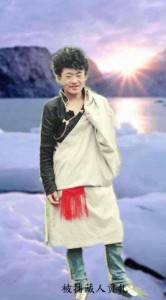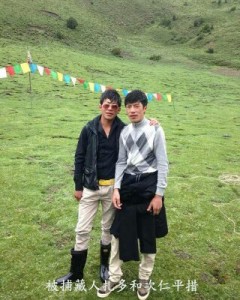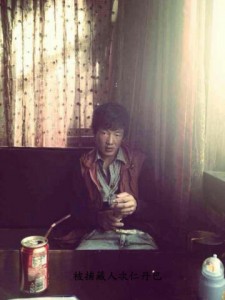
Chinese authorities have detained 17 known Tibetans in separate incidents following the outbreak of popular protests against China’s ‘mass-line’ campaigns in Diru (Ch: Biru) County in Nagchu (Ch: Naqu) Prefecture, Tibet Autonomous Region (TAR).
According to information received by TCHRD, on the night of 3 November 2013, local authorities arbitrarily detained 15 Tibetans at Tengkhar Village in Shamchu Township in Diru County. Among them, three were women, who were identified as Sarkyi, 49, Tsophen, 47, and Yangkyi, 25. Sarkyi is the mother of two sons: Lamsang 24, and Tsewang Lhakyap, 19, both of whom were also detained. Others detained in Tengkhar village are Tsering, 22, Tsering Phuntsok, 21, Tador (perhaps a shortened form of Tashi Dorjee), 21, Kundak, 17, Gabug, 41, Tsering Tenpa, 22, Thupchen, 27, Soeta, 25, Tsering Jangchup, 21, and Jigme Phuntsok, 23.
The detention took place in the backdrop of political education campaigns and repeated petitioning by local Tibetans for the release of Tibetan writer, Tsultrim Gyaltsen aka Shogdril and his friend, Yugyal, who were arrested and subsequently disappeared in the intervening period of 11 and 12 October 2013 in Tengkhar Village. Local Tibetans have approached Township and County authorities a number of times demanding information on the whereabouts and unconditional release of both men who remain missing for the past 26 days.

Sources told TCHRD that local authorities have banned Tibetans from petitioning in large groups and that petitioning by more than five people would considered be an act of ‘political error’. Local Tibetans were ordered to submit their petitions in writing which they did a number of times but so far, local authorities have failed to respond.
On 3 November 2013, County and Township officials arrived at Tengkhar Village and ordered local Tibetans to attend a meeting where they were forced to participate in political education sessions. Sources said some Tibetans expressed their views on official policies, but these views were ignored.

That same evening, Tsophen, Sarkyi and Yangkyi confronted the permanent party cadres stationed in Tengkhar Village and questioned them about the fate of writer Tsultrim Gyaltsen and his friend, Yugyal. Sources said the verbal confrontation with the party cadres was marked by emotional outbursts from the three Tibetan women who demanded the cadres to come clean on the whereabouts of the two disappeared Tibetan men. “They asked the cadres if the Chinese government believed that the two men had violated the country’s laws, they should specify which constitutional provisions they had violated and to stop being secretive about the case. They also told the cadres that the government cannot arbitrarily arrest people without any shred of evidence to back their claims,” a source with contacts in Tibet told TCHRD. But the women were promptly arrested after the cadres called in police to resolve the matter.
Late that night at around 11 pm, a group of ten Tibetan men were arrested outside the office of the permanent cadres base in Tengkhar Village. It is not yet clear in what circumstances they were arrested but some sources say that at the time of arrest, they were discussing the meeting that was held that day to give political education to local Tibetans. Information regarding the arrest of the young men remain inadequate as all channels of communication remain blocked or heavily monitored. Intense state surveillance over personal communication has made it impossible for many Tibetans to contact family members and relatives outside Tibet. Recent interviews with new Tibetan refugees conducted by TCHRD attest to the fact that arrests and imprisonment have become more frequent since the implementation of mass surveillance campaigns in October 2011 in TAR and other Tibetan areas, a campaign which is now being promoted under the current president Xi Jinping’s “mass line” policy.

The day after the arbitrary detention of 13 Tibetans, on the morning of 4 November 2013, about a hundred armed police from Diru County reached Tengkhar village, with some of the armed police setting up tents near the Gyalmo Ngulchu (Salween) river. Since then, locals in Tengkhar Village have been forbidden to venture out of their homes after dark as armed police continue to keep a strict watch their movements. No Tibetan is allowed after dark to visit temples or offer prayers at sacred rock cairns or to work in the grassland.
Two additional arrests have been reported by sources in Diru County. Kunchok Jinpa, a Tibetan man from Village no. 5 in Chaktse (Ch: Qiaze) Township has been missing less than a month after his arrest. Another man, Dhargyal, from Chaktse Township has been missing for the past two weeks. Both men had disappeared during protests against China’s compulsory flag-flying campaign in Diru County.
Sources also reported that a Tibetan man named Zom Lhagya was arrested in the aftermath of the October 2012 self-immolation protest by Tibetan writer Gudrup in Diru County. Zom Lhagya was sentenced to a year in prison and is being held in Chushur Prison in the outskirts of Lhasa city. His prison term expired last month, however, sources now say that his term was extended by another year. There is no information on how the term was extended or whether Zom Lhagya indeed deserved the extension. Sources told TCHRD that the extension was unlawful and politically motivated given the ongoing crackdown in Diru County.
On 6 November 2013, three days after the detentions in Tengkhar Village, TAR deputy party secretary Wu Yingjie addressed a huge gathering of TAR Armed Police Corps and other high-ranking officials at the Xiangshan square in Diru County. Official Chinese media reported that Wu had called on the armed police force to continuously fight in maintaining stability in Diru County and to “further strengthen patrol duty, control and grid management.” The report projected the current crackdown in Diru County as part of security measures in the run-up to the party’s Third Plenum to be held in the second week of November 2013. The truth is the ‘mass line’ campaign has been implemented in the past two years in TAR before Xi’s accession to the post of president of the People’s Republic of China. Periodic crackdowns during sensitive anniversaries or party meetings have only increased the level of crackdown than ending it for good.
